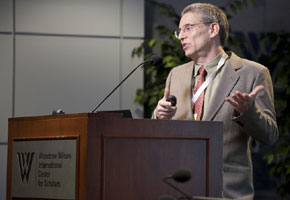

Sergio Schenkman (Unifesp) spoke about the current scenario confronting tropical research, with emphasis on Chagas disease (photo:JVInfante Photography/Wilson Center)
Scientists highlight variables that complicate the discovery of treatments for diseases like malaria and dengue, no longer restricted to the poorest countries.
Scientists highlight variables that complicate the discovery of treatments for diseases like malaria and dengue, no longer restricted to the poorest countries.

Sergio Schenkman (Unifesp) spoke about the current scenario confronting tropical research, with emphasis on Chagas disease (photo:JVInfante Photography/Wilson Center)
Agência FAPESP – During the final session of FAPESP Week, held October 24-26 in Washington, DC, Sergio Schenkman, Full Professor in the Microbiology, Immunology and Parasitology Department of the (Unifesp), spoke about the current scenario confronting tropical research, with emphasis on Chagas disease.
"These are known as the neglected tropical diseases and that is due to the absence of direct economic interest. Pharmaceutical companies are not interested and few people end up working with these diseases. But Trypanosoma, the parasite that causes Chagas disease, is not only in South America, but also in Africa, Europe, Asia and even in the United States. In other words, these diseases are not a problem in just the poorest countries, but also in the richest.”
Schenkman is coordinator of the Thematic Project "Cell organization in the differentiation and in the cell cycle of Trypanosoma" funded by FAPESP.
"Sequencing of the genome Trypanosoma cruzi and other trypanosomes in 2005 provided important tools to achieve control of diseases like Chagas, especially with regard to the development of new drugs. However, there are still many challenges to be overcome due to the complex and yet unknown biology of these parasites," he noted. He went on to say, "Our approach has been to identify signals that are used by the parasites to induce or control these adaptations. We need to understand the conditions required for the establishment of the parasitism. That is, the mechanisms that control their development inside the host.”
The group led by Schenkman has investigated the signals that cause the trypanosome to go through specific transformations and develop as a function of the environment found in their different hosts.
This same session on tropical diseases also included Elodie Ghedin, Assistant Professor in the Department of Computational and Systems Biology at the University of Pittsburgh who presented the results of studies performed with parasitic nematodes that cause diseases like filariasis.
Also known as elephantiasis or filariosis, the thickening of the skin and underlying tissues is caused by worms such as Wuchereria bancrofti and Brugia malayi, the latter a subject of particular study by Ghedin’s group. "Lymphatic filariasis affects more than 80 countries, which make up nearly one fourth of the world’s population,” she stated.
Ghedin and her team study the development of parasitic nematodes, comparing how worms that infect humans develop as compared to others that live freely in the environment. "The Brugia malayi maintain a symbiotic relationship with a bacterium, Wolbachia, and this relationship represents a potential target for the study of therapies,” she concluded.
The origin and evolution of diversity in malaria parasites was the topic of the presentation by Marcelo Urbano Ferreira, Professor of Parasitology at the Biomedical Sciences Institute at the Universidade de São Paulo.
He noted, "Unlike other types of viral and bacterial pathogens that lead to long-term immunity after an initial infection, the malaria parasites require several years of continuous exposure to confer partial immune protection.”
Ferreira and his group conducted field research at an Amazonian International Center of Excellence in Malaria Research (ICEMR), funded by the US government’s National Institutes of Health (NIH) in Remansinho (AM). "It was no coincidence or surprise that the site we studied lies within a large deforested area,” he concluded. The study in Remansinho is also supported by FAPESP.
Nikolaos Vasilakis of the University of Texas Medical Branch spoke about dengue, emphasizing that it is no longer a disease restricted to one or more countries or continents, but rather, is now present all over the world. He stated, "In the past, viruses took years to go from one region to another, but today, because travel is so easy, this can happen in just a matter of hours.”
"Dengue viruses are by far the most important arboviral pathogens in the tropical regions, placing nearly a third of the world population at risk of infection. Since humans are the only vertebrate host of the dengue virus, this means that there are no other animal models for studying the disease.”
Republish
The Agency FAPESP licenses news via Creative Commons (CC-BY-NC-ND) so that they can be republished free of charge and in a simple way by other digital or printed vehicles. Agência FAPESP must be credited as the source of the content being republished and the name of the reporter (if any) must be attributed. Using the HMTL button below allows compliance with these rules, detailed in Digital Republishing Policy FAPESP.





